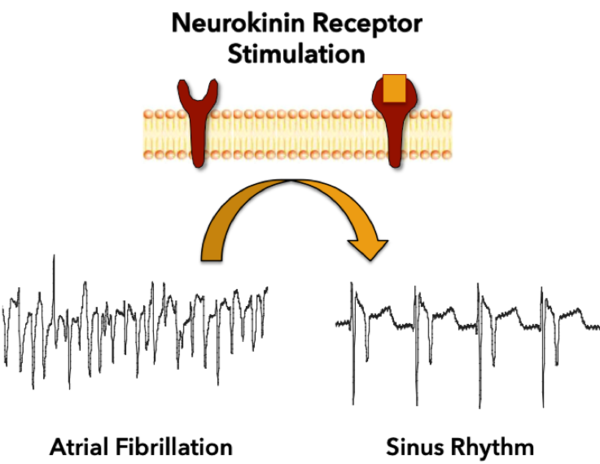Neurokinin-receptor stimulation as a novel therapy for treating atrial fibrillation
Previously it was established that stimulation of a neurokinin-receptor subtype in rabbit heart exerts an anti-arrhythmic action in atrial fibrillation (AF) by prolonging the action potential exclusively in the atrium. Preliminary data have demonstrated that a similar pathway is functional in human atrial myocardium.
The purpose of the present project is to establish the potential of neurokinin-receptor stimulation as a novel atrial-specific target for treatment of AF. NeuCures, active in neurocardiology and the development of new therapeutics that involve neuromodulation, has a large animal model of AF fully operational thereby providing a reproducible experimental platform to test the anti-arrhythmic potential of this novel target.
AF is the most prevalent sustained arrhythmia in clinical practice, affecting ~2% of the general population. AF patients have increased morbidity and mortality, with heart failure and stroke being the most serious complications. Current pharmacotherapeutic approaches in AF aimed at prolonging of the atrial action potential, have diminished clinical success rate by the limited selectivity for atrial tissue, potentially leading to life-endangering ventricular pro-arrhythmia. Therefore, novel atrial-selective drug targets are needed for effective and safe pharmacological management of AF.
In human induced pluripotent stem cell (hiPSC)-derived atrial cardiomyocytes, the potency for action potential prolongation of subtype-specific neurokinin-receptor agonists is being studied, to specify the key components involved in the human neurokinin-receptor pathway. In hiPSC-derived ventricular cardiomyocytes, the absence of action potential prolongation on neurokinin-receptor stimulation is being verified, to confirm atrial-specificity. In a large-animal model of human AF, the capacity of relevant neurokinin-receptor agonists to terminate AF is being investigated to demonstrate the anti-arrhythmic potential of neurokinin-receptor stimulation in vivo.
Thus, novel druggable targets are provided for the development of new anti-arrhytmic agents with a broad applicability in the management of AF without the side effects of current pharmacotherapies.

This collaboration project is co-funded by the PPP Allowance made available by Health~Holland, Top Sector Life Sciences & Health, to AMC to stimulate public-private partnerships. For questions, please contact AMC directly via the following email address tki@ixa.nl.


